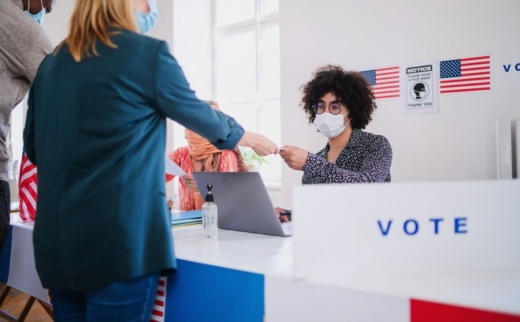A U.S. district court judge's decision that would have required all Texans to wear face coverings in polling places during the general election is on hold following after the U.S. Court of Appeals for the Fifth Circuit temporarily halted the ruling Oct. 28.
The Oct. 27 decision by U.S. District Judge Jason Pulliam voided a portion of Gov. Greg Abbott's statewide face covering order issued in July that had exempted voters, election workers and poll watchers from adhering to the masking mandate at polling locations. In his decision, Pulliam sided with plaintiffs, including the civic and civil rights organizations Mi Familia Vota and the Texas State Conference of the NAACP, who said the exemption violated the Voting Rights Act due to the disproportionate COVID-19 case, hospitalization and death rates that Black and Latino Americans experience.
The plaintiffs argued that, due to higher health risks related to COVID-19, a lack of protection against the disease at the polls could disenfranchise minority voters by keeping them from voting in person. In his decision, Pulliam acknowledged the face covering exemption could deter or deny Black and Latino Texans from voting and that voiding the exemption would not substantially affect the ongoing election.
Gov. Abbott and Secretary of State Ruth R. Hughs, the defendants in the case, appealed Pulliam's decision Oct. 27 resulting in the Fifth Circuit granting a temporary administrative stay Oct. 28. The court will now decide whether to grant the stay on the district court decision requested by Abbott and Hughs.
Posted Oct. 28 6:20 p.m.
An exemption in Gov. Greg Abbott's July statewide face covering order that allowed voters, election workers and poll watchers to abstain from wearing masks in polling places was invalidated Oct. 27 by a San Antonio judge who cited the exemption as discriminatory against Black and Latino Texans' voting rights.
With the voiding of the exemption, face coverings over the wearer's nose and mouth are now required at polling places—although the decision was appealed by the state Oct. 27. In-person voting remains open statewide through the less than three remaining days of early voting, which concludes Oct. 30, and on Election Day Nov. 3.
The decision by U.S. District Judge Jason Pulliam stemmed from a complaint initially brought against Abbott and Secretary of State Ruth R. Hughs in July by Texas residents Micaela Rodriguez and Guadalupe Torres, the national Latino and immigrant civic engagement organization Mi Familia Vota, and the Texas State Conference of the NAACP civil rights organization.
The October decision concerned the plaintiffs' claim Exemption 8 of the statewide masking mandate, which made face covering requirements optional for "any person who is voting, assisting a voter, serving as a poll watcher, or actively administering an election," violated Section 2 of the Voting Rights Act by creating an alleged "discriminatory deterrence from voting," according to the October decision.
Torres, Mi Familia Vota and the NAACP conference initially argued for a wider array of changes to voting procedures during the general election in Texas this year, arguments that were dismissed by Pulliam in September. The judge's Oct. 27 decision concerned only the exemption for mask-wearing in polling places after the U.S. Fifth Circuit Court of Appeals handed the case back down to the district court to determine whether the portion of Abbott's July order in question conflicted with the Voting Rights Act and if removing the exemption would affect the election and address the plaintiffs' concerns.
According to the October district court filing, the plaintiffs alleged Black and Latino Americans' general increased risk of COVID-19 infection and related hospitalization and death combined with the health risks associated with possible exposure and spread of the disease at polling places could keep minority voters from political participation this fall.
"[The] disproportionate infection rate and the more severe health consequences that Black and Latino people face from the coronavirus mean that voting procedures that fail to provide the necessary health and safety protections to all voters in the context of this pandemic will disproportionately burden the rights of Black and Latino voters, in particular," the plaintiffs argued, according to Pulliam's decision.
Nationwide data compiled by the Centers for Disease Control and Prevention shows that, compared to non-Hispanic white people, the COVID-19 case rate ratio is 2.6 times higher among non-Hispanic Black or African-American people and 2.8 times higher for Hispanic or Latino people. COVID-19 hospitalization rates compared to white people are 4.7 times higher among Blacks and 4.6 times higher among Latinos, while COVID-19 death rates among Black and Latino Americans 2.1 and 1.1 times higher than among whites, respectively.
In his decision, Pulliam voided Exemption 8 of the face-covering order and said any effects of the change would be outweighed by the resolution of the discriminatory issue at the polls. All other exemptions and enforcement provisions of Abbott's order were unaffected.
"Exemption 8 imposes a 'voting practice or procedure which results in a denial or abridgement of the right of Black and Latino citizens to vote on account of race or color,'" Pulliam wrote. "The mask-mandate Exemption 8 is invalid and void does not 'materially or substantially affect the ongoing election,' and any disruption is outweighed by the racially discriminatory deterrent effect on Black and Latino citizens’ fundamental right to vote."
Abbott and Hughes filed a notice of appeal to the Fifth Circuit Oct. 27 following Pulliam's decision.





